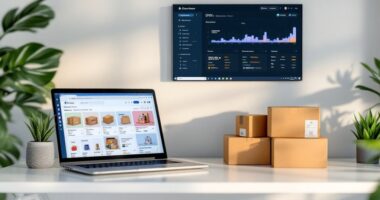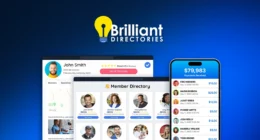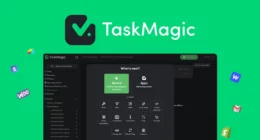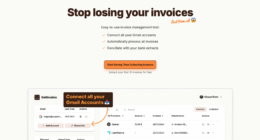Marketing campaign software centralizes planning, execution, and analysis of marketing initiatives across multiple channels. These platforms offer essential features like content management, audience targeting, and performance tracking, with many incorporating AI-driven automation that generates $5.44 in revenue for every dollar spent. Popular options include all-encompassing solutions like HubSpot, email-focused tools like Mailchimp, and social media managers like Hootsuite. Understanding the key components helps businesses select the right platform for their specific needs.
Quick Overview
- Marketing campaign software centralizes planning, execution, and analysis of marketing campaigns across multiple channels from a single platform.
- Popular options include HubSpot for comprehensive solutions, Marketo for enterprises, and Mailchimp for email-focused marketing campaigns.
- Automation features handle repetitive tasks and deliver personalized content, generating $5.44 in revenue for every dollar spent.
- Essential features include user-friendly interfaces, analytics tools, audience segmentation, and multi-channel campaign management capabilities.
- Modern platforms incorporate AI-powered tools, omnichannel integration, and data privacy measures for enhanced marketing effectiveness.
Understanding Marketing Campaign Software Essentials

As businesses increasingly rely on digital marketing to reach their audiences, marketing campaign software has become an essential tool for modern marketing teams. This specialized software serves as a central hub for planning, executing, and analyzing marketing campaigns across multiple channels.
At its core, marketing campaign software offers several fundamental capabilities:
- Campaign planning and strategy development
- Content creation and management
- Audience targeting and segmentation
- Multi-channel campaign coordination
- Performance tracking and analytics
Marketing teams can choose from various types of platforms, including:
- All-encompassing marketing solutions like HubSpot
- Email marketing tools such as Mailchimp
- Social media management platforms like Hootsuite
- CRM systems
- Analytics-focused tools
The right software choice depends on specific business needs, existing technology infrastructure, and team capabilities. Software with social listening features helps businesses monitor online conversations and maintain their brand reputation effectively. Modern platforms like omnichannel automation tools enable businesses to create seamless customer experiences across email, SMS, and messaging platforms.
Top Features That Drive Campaign Success
While numerous factors contribute to marketing success, certain key software features consistently prove essential for driving effective campaigns. The most impactful features include user-friendly interfaces with intuitive layouts and customizable dashboards that minimize learning curves. Automated marketing processes through campaign management software help businesses streamline their operations efficiently. Popular platforms like email marketing solutions such as Mailchimp offer comprehensive automation capabilities for enhanced campaign performance.
Extensive analytics tools deliver real-time performance tracking and data-driven insights, enabling marketers to measure ROI effectively. Multi-channel campaign management capabilities guarantee consistent messaging across platforms, while advanced audience segmentation allows for targeted messaging based on demographics and behavior.
These features work together to enhance customer engagement and improve conversion rates. Additionally, robust collaboration tools streamline workflow through shared dashboards, real-time updates, and efficient approval processes.
When combined, these features create a powerful foundation for executing successful marketing campaigns while maintaining team coordination and campaign effectiveness.
Maximizing ROI Through Automation Tools
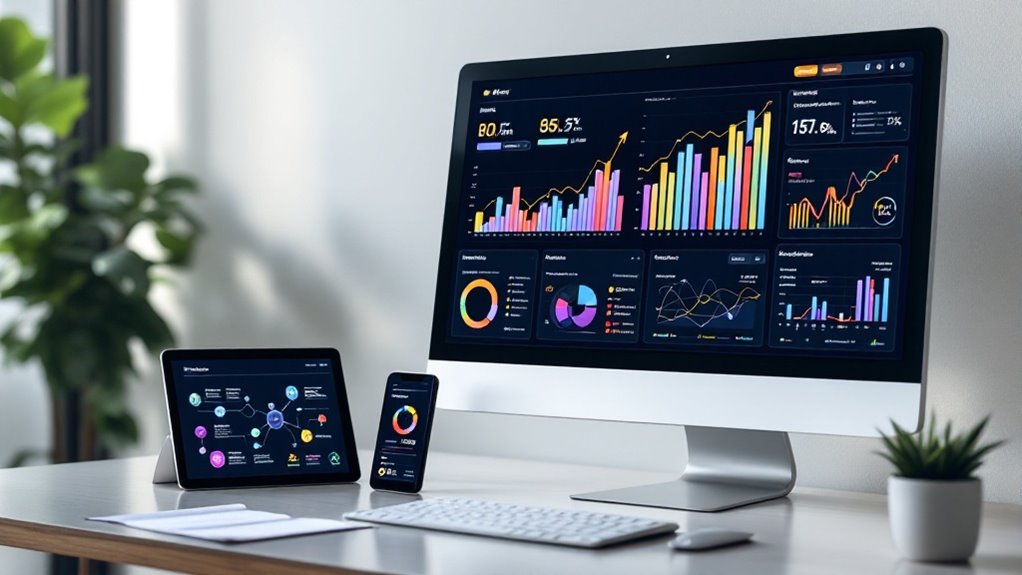
Marketing automation tools represent a powerful investment for modern businesses seeking to amplify their campaign returns. Companies typically see $5.44 in revenue for every dollar spent on automation, with 76% achieving ROI within their first year of implementation.
Success with automation stems from three key factors: workflow optimization, personalized targeting, and consistent measurement. By automating repetitive tasks like email follow-ups and social media management, teams can focus on strategic initiatives. Modern businesses increasingly rely on artificial intelligence integration, with 40% of companies intelligently automating up to 10% of their marketing tasks. Popular platforms like EngageBay and HubSpot offer comprehensive solutions for streamlining these marketing operations.
Automation empowers teams to elevate strategy by streamlining workflows, personalizing outreach, and measuring impact consistently across marketing channels.
Personalization capabilities allow marketers to segment audiences and deliver tailored content at scale, with 77% of marketers leveraging automation for customized messaging.
To maximize returns, businesses should:
- Track lead conversion rates and customer acquisition costs
- Review pipeline metrics quarterly
- A/B test campaigns regularly
- Integrate CRM systems with marketing tools
- Analyze performance data to refine strategies
Choosing the Right Platform for Your Business
Selecting the right marketing campaign software represents a critical decision that can greatly impact a company’s digital success. To make an informed choice, businesses must evaluate several key factors that align with their specific needs and goals.
The evaluation process should begin with a clear assessment of budget constraints, scalability requirements, and integration needs. Platforms like HubSpot offer comprehensive marketing features ranging from email campaigns to social media management and SEO tools. Companies should consider popular options like HubSpot for all-in-one functionality, Marketo for enterprise-level capabilities, or Mailchimp for user-friendly email marketing. These solutions enable customer segmentation tools to help businesses better understand and target their audience effectively.
Industry-specific requirements, such as B2B versus B2C features and regulatory compliance, must also factor into the decision.
Best practices for selection include:
- Testing multiple platforms through demos and trials
- Gathering feedback from potential users
- Comparing features against business requirements
- Analyzing long-term ROI potential
Best Practices for Implementation and Usage

Once a business has chosen its marketing campaign software, successful implementation and effective usage become the next significant focus. The key to maximizing the platform’s potential lies in following proven best practices that drive results.
Organizations should start by defining clear, measurable goals and establishing relevant KPIs to track progress. Data-driven decision-making forms the foundation of successful campaigns, utilizing customer insights and A/B testing to optimize performance.
Streamlining workflows through automation and standardized templates helps teams work more efficiently, while ensuring cross-channel integration creates seamless customer experiences across all touchpoints.
Tools like Twilio Engage enable robust customer segmentation capabilities across multiple marketing channels. Finally, maintaining a culture of continuous learning and optimization keeps teams ahead of industry trends. Regular training sessions, staying updated on best practices, and encouraging experimentation all contribute to long-term success with marketing campaign software.
Future Trends in Campaign Management Technology
As technology continues to evolve at a rapid pace, the future of campaign management software is poised for significant transformation.
Artificial intelligence and machine learning are becoming central features, enabling predictive analytics and automated content personalization. These advancements are revolutionizing how marketers interact with their audiences. A remarkable 73% of marketers now regularly utilize AI tools for campaign management and analysis.
Lead nurturing automation is becoming essential for organizations to maintain personalized customer relationships at scale. Omnichannel marketing automation is emerging as a cornerstone of future campaign management, allowing seamless integration across multiple platforms while maintaining unified customer profiles.
Voice and visual search capabilities are gaining prominence, with augmented reality experiences and smart device integration becoming standard features.
Additionally, enhanced data privacy measures and advanced analytics are shaping the industry’s direction.
Organizations are adopting cookieless tracking methods and blockchain technology for transparency, while real-time dashboards and predictive modeling provide deeper insights into campaign performance.
Frequently Asked Questions
How Long Does It Typically Take to Train Staff on Campaign Software?
Training staff on campaign software typically takes 2-4 weeks for basic proficiency, with full mastery achieved in 3-6 months.
The timeline varies based on software complexity and team experience.
Online courses can reduce training time by up to 60%, while hands-on workshops accelerate skill development.
Role-specific modules and peer training further optimize the process.
Regular 1-2 hour weekly sessions help staff stay updated on new features and maintain proficiency.
Can Marketing Campaign Software Integrate With Legacy Business Systems?
Despite what skeptics might think, modern marketing campaign software readily integrates with legacy business systems.
Through APIs, service layers, and pre-built connectors, these platforms can seamlessly connect with older systems. Integration enables real-time data exchange, providing a unified view of customer information.
While challenges like data compatibility and security concerns exist, proper implementation strategies and integration tools help organizations overcome these obstacles.
The key is careful planning and systematic execution.
What Security Measures Protect Customer Data in Campaign Management Platforms?
Modern campaign management platforms employ multiple layers of security to protect customer data.
These include robust encryption (AES-256) for data both in transit and at rest, multi-factor authentication for user access, and role-based permissions to control data visibility.
Regular security audits guarantee compliance with regulations like GDPR and CCPA.
Additionally, platforms maintain secure API connections, implement firewalls, and conduct routine vulnerability assessments to safeguard sensitive information.
Are There Industry-Specific Templates Available for Different Business Sectors?
Yes, industry-specific templates are readily available across various business sectors.
These templates are customized for industries like retail (seasonal promotions, product launches), healthcare (patient education, wellness campaigns), technology (software releases, user acquisition), finance (investment products, retirement planning), and education (enrollment drives, alumni engagement).
Each template includes pre-designed elements, workflows, and content frameworks that align with industry-specific goals, compliance requirements, and best practices.
How Often Should Marketing Campaign Software Be Updated or Replaced?
Marketing campaign software typically requires updates every 3-6 months, with quarterly reviews being the standard practice.
The frequency depends on several factors, including budget size, industry dynamics, and campaign performance. Organizations should monitor key indicators like:
- Declining performance metrics
- Changes in target audience behavior
- New marketing channel emergence
- Campaign completion cycles
More frequent updates may be necessary for new campaigns, while established programs might need less frequent adjustments.
Conclusion
Marketing campaign software continues to evolve at lightning speed, transforming how businesses connect with their audiences. As AI and automation reshape the landscape, companies that embrace these powerful tools will stay ahead of the curve. The future promises even more sophisticated features, deeper analytics, and seamless integration capabilities. Success awaits those who master these platforms while keeping the human touch at the heart of their campaigns.




